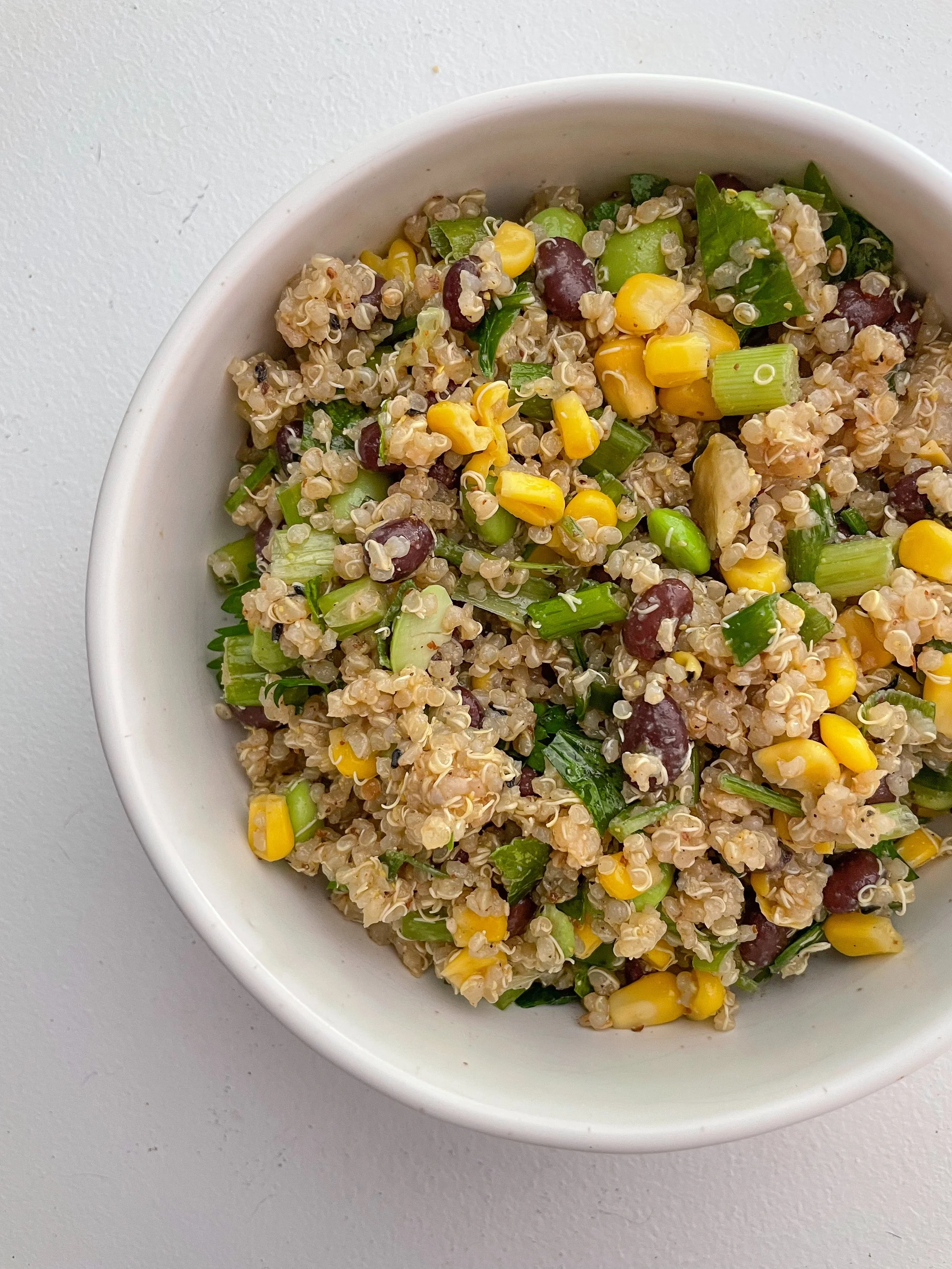Common Causes of Anxiety
I support a lot of anxious people in my practice so I felt a blog post some common causes I see would be helpful. You may feel overwhelmed easily, have butterflies in your tummy or avoid new environments.
Here is a checklist I go through with clients. It can be a lot so I definitely recommend working with a holistic practitioner, like myself, to get to the root cause. A multifaceted approach is required addressing lifestyle and nutrition.
1 - Blood Sugar Levels
Your brain runs on glucose and if your blood sugars are low, the symptoms will mimic anxiety. I’m sure we’ve all felt this - maybe even agitated or dizzy - when we’ve gone too long without eating. I know I sure have, especially if I don’t eat breakfast within 60-90 minutes of waking. Try and build your meals with 50% veggies, 25% protein, 25% starchy carb and then add healthy fats. This will ensure your meals are balanced and mood supportive. If you start paying attention to the times you eat, you’ll be more aware how frequently you need to eat. Some of my clients only eat 3 meals a day and others need snacks. The main takeaway is to listen to the cues your body is giving you. Be patient, this takes time as so many of us are overwhelmed and trying to accomplish too much in a day. Do you need a blood glucose monitor if you aren’t diabetic? No.
2 - Caffeine
Are you waking up and caffeinating before having water and eating? I brush my teeth (gut health!!), drink water and make my soy milk matcha (8 grams of protein) before I make breakfast. This is not ideal for someone that feels anxious! Having your caffeinated beverage after you eat will support balanced stress hormones and blood sugars. You can enjoy it with your breakfast too, just know it can deplete iron absorption if yours is low. Many people are familiar with that jittery feeling that coffee gives them. If that’s you, I suggest switching to decaf, matcha or alternatives like cacao, herbal infusions or dandelion based prebiotic drinks.
3 - Dopamine levels
HVA is the dopamine metabolite that is formed in the brain from dopamine metabolism. High levels can cause anxiety, insomnia and hypervigilance. Levels may also increase due to supplements like tyrosine and quercetin, DLPA, L-Dopa and mucuna, and medications, including SNRIs (Wellbutrin/Buproprion), tricyclic antidepressants, amphetamines/amphetamine-like medications, appetite suppressants, opioids, short-term THC (tetrahydrocannabinol) use, caffeine and ephedrine (including Sudafed). Interestingly, bananas, avocados, and fava beans also have high levels of dopamine. If a client and I are doing DNA testing, I’ll look at COMT and MAO as it breaks this neurotransmitter down. Regulating blood sugar may also be helpful in decreasing HVA levels. If you relate to these symptoms below, reach out for a supplement strategy.
High dopamine symptoms
• Loss of memory
• Insomnia
• Agitation, nervousness
• Hyperactivity
• Mania, Paranoia
• Hyper-focus
• Hypersexuality
• High stress and anxiety, irritability
• Addictions, cravings and pleasure seeking (to maintain high levels)
• Often very focused, lots of projects, stays up late working, difficulty falling asleep
Low dopamine symptoms
• Addictions, cravings and pleasure seeking (to boost levels)
• Sleepiness
• Impulsivity
• Tremors
• Less motivation, loss of interest
• Drop in sex drive
• Forgetfulness
• Schizophrenia/Autism/ADHD
• Fatigue
• Low mood
• Mood swings, depression/anxiety
• Isolation
• Often low focus, distracts easily, needs dopamine increases throughout the day like coffee, chocolate, social media, stimulation.
4 - Gut Health
This is a HUGE topic and should probably be it’s own blog post! If you have opportunistic bacteria, parasites, candida, LPS endotoxin, intestinal permeability, it will all impact neurotransmitters and hormone health. This is due to the gut-brain axis, the majority of communication is from the gut to the brain. It’s estimated at least 90% of serotonin, the happy neurotransmitter, is made in the gut. If serotonin low due to an altered gut microbiome, mood will be impacted and there’s even a potential link with IBS. Gamma-aminobutyric acid (GABA) is the calming neurotransmitter by decreasing activity in the nervous system. Clients that felt anxious supplemented with GABA chewable tablets and noticed a difference quickly. Alcohol and stress will impact your production of GABA as well as overall gut health.
Dysbiosis and inflammation have been linked with anxiety and low mood, which is why I love using the GI-MAP stool test in my practice to see commensal (good) bacteria, opportunistic (unwanted in high amounts) bacteria, viruses, parasites, gluten reactivity and intestinal inflammation. We can also see your elastase (pancreatic enzyme) and steatocrit (fat in stool) and this gives major insights into your digestion and absorption. If you’re low in nutrients, you will be susceptible to feeling anxious because the body isn’t getting what it needs.
As a women, our gut permeability even changes with our menstrual cycle. I find this so fascinating. Just remember, there is no need to test for ‘leaky gut’ because it is the outcome of a pathogen or unwanted organism. Look for the root cause!
“Another factor is the new finding that progesterone can cause intestinal permeability leading to high LPS endotoxin and negative mood symptoms in the luteal phase. According to the research, women are more at risk of this endotoxin effect if they have an underlying problem with chronic progesterone deficiency and high estrogen.’
5 - The Vagus Nerve
I have an entire blog post on this so click here to dive deeper. This is the longest nerve in our body going from the brain to the gut and is part of your parasympathetic nervous system. Singing, gargling, massage, deep slow breathing and cold exposure are just some of the ways to strengthen the vagus nerve.
6 - Norepinephrine and Epinephrine
This is shown as the metabolite VMA on a DUTCH test. VMA can elevate due to insulin issues, high or low cortisol, and stimulants and appetite suppressants like amphetamines/amphetamine-like medications, caffeine and ephedrine (ie. Sudafed). Elevated VMA can cause feelings of fight or flight, anxiety, insomnia, hyper-vigilance, sweating, and increased heart racing. Supporting blood sugar, encouraging parasympathetic nervous system balance and adaptogens for cortisol levels is key. Speak with your holistic healthcare provider, but I personally love ashwagandha for regulating cortisol and supporting stress.
7 - Heavy Metals
Mercury is frequently found in fish and amalgam fillings and can lead to feeling anxious. Client’s may have altered mitochondria function, feel fatigued and have inflammation. I use hair tissue mineral analysis to check for heavy metals in clients. If you have amalgam’s contact a holistic dentist and consider bringing chlorella for removal. I actually love Green’s First on my Fullscript supplement account for heavy metal reduction.
8 - Antibiotics
Sometimes, we need antibiotics. I always advocate only taking them when they are truly needed. Our western medical system often hands antibiotics out without taking a culture, which can lead to unnecessarily taking them. I was listening to a podcast many moons ago that mentioned one round of antibiotics can cause major depressive disorder in 12 month and anxiety in 24%. Two courses resulted in depression in 44% and anxiety in 52%. We cannot connect to ourself without the microbiome. I found a different research paper confirming the connection.
9 - High or Low Progesterone
We want optimal levels of progesterone, but having it really low or high can make us feel super anxious. Progesterone stimulates GABA, the feel good calming neurotransmitter. Pay attention to your menstrual cycle and log if you feel more anxious after ovulation (in your luteal phase) when progesterone is higher. If so, try magnesium bisglycinate to calm GABA receptors and relieve PMS.
If you have PMDD, your GABA receptors aren’t as good at adapting and this contributes to anxiety as well. I use the DUTCH test in clinic to assess progesterone metabolites via urine.
10- Eating Patterns and Quality of Food
I previously mentioned trying to have breakfast within an hour of waking. For women’s hormone health, this is ideal. We have an infradian rhythm unlike men - our needs change daily. Intermittent fasting, 12-13 hours overnight, is great for the migrating motor complex (MMC) and gut health. Going beyond that, can negatively impact pre-menopausal women’s health and hormone levels. I also recommend eating something small prior to a workout as your cells are hungry, even if you’re not (red flag!).
We also must focus on 80% quality nutritious foods versus a diet in processed foods. If you aren’t getting enough magnesium, B vitamins and fibre, you may be more at risk of feeling anxious. I could also write an entire blog post on purchasing organic food for gut health and nervous system support. New research is emerging and intuitively, I believe organic food is the way to go for our health, the farmers, the planet and the animals.
11 - Perfectionism
There’s always a mind, body, spirit component to imbalances in the body. I associate constipation with not wanting to let go. Anxiety often occurs when we don’t feel grounded or in control. It often comes from a place of trying to be perfect. We need to get out of ego and caring what others think. NO ONE IS PERFECT. I’m a huge proponent of talk therapy and working through past trauma. I also love Lacy Phillip’s Instagram, even though it hasn’t been popping up for me with the current algorithm.
I hope these topics encourage reflection and curiosity. I’m here if you’d like a deep dive and more support getting to the root cause. Head to services to learn more and don’t hesitate to reach out with any questions.
Jordan Bruce Wellness































